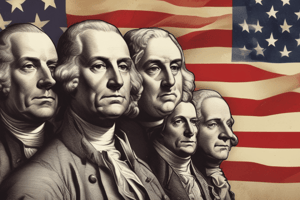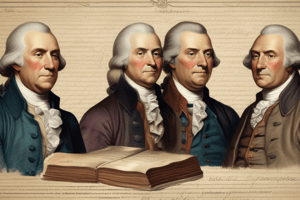Podcast
Questions and Answers
Who was elected unanimously as the first president of the United States in 1789?
Who was elected unanimously as the first president of the United States in 1789?
- Thomas Jefferson
- George Washington (correct)
- Benjamin Franklin
- Alexander Hamilton
What was the main purpose of Alexander Hamilton's national bank?
What was the main purpose of Alexander Hamilton's national bank?
- To promote westward expansion
- To strengthen state governments
- To increase international trade
- To reduce the national debt (correct)
What was the main concern of Thomas Jefferson regarding the federal government?
What was the main concern of Thomas Jefferson regarding the federal government?
- It was too corrupt
- It was too weak
- It was too small
- It was too strong (correct)
What was the main significance of the Bill of Rights in 1791?
What was the main significance of the Bill of Rights in 1791?
What was the Whiskey Rebellion about?
What was the Whiskey Rebellion about?
What was the significance of Washington's Proclamation of Neutrality in 1793?
What was the significance of Washington's Proclamation of Neutrality in 1793?
What was the main purpose of the Constitution in 1787?
What was the main purpose of the Constitution in 1787?
What was the significance of George Washington's two-term limit?
What was the significance of George Washington's two-term limit?
What was the main characteristic of Thomas Jefferson's vision for the US?
What was the main characteristic of Thomas Jefferson's vision for the US?
What was the significance of the period between 1789-1807?
What was the significance of the period between 1789-1807?
Flashcards are hidden until you start studying
Study Notes
The Dawning of a Nation: US History 1789-1807
Founding Fathers Take Center Stage
- George Washington: First president of the United States, unanimously elected in 1789, set many precedents for future presidents, established a two-term limit, and brought prestige and unity to the young nation.
- Alexander Hamilton: Brilliant economist and first Secretary of the Treasury, championed a strong federal government and a national bank, often clashed with Thomas Jefferson's ideas.
- Thomas Jefferson: Secretary of State under Washington, advocated for a limited federal government, states' rights, and envisioned an agrarian republic built on the backs of farmers.
Washington's First Term (1789-1793)
- Building the Government: Established the first executive departments (State, Treasury, War) with his cabinet advisors, and the federal judiciary was also created.
- The Bill of Rights (1791): First ten amendments to the Constitution, guaranteeing fundamental rights like freedom of speech, religion, and the press, helping to quell anxieties about a powerful central government.
- Whiskey Rebellion (1791-1794): Farmers in western Pennsylvania resisted a federal tax on whiskey, Washington used military force to suppress the rebellion, demonstrating the power of the federal government to enforce laws.
Foreign Policy
- Washington declared neutrality in the war between France and Britain, a controversial decision, but one that kept the young nation out of a larger conflict.
Important Documents
- Constitution (1787): Outlined the three branches of government (legislative, executive, judicial) and a system of checks and balances.
- Bill of Rights (1791): Protected individual liberties and limited government power.
- Proclamation of Neutrality (1793): Washington's official declaration that the US would stay neutral in European conflicts.
Looking Ahead
- By 1807, the US had taken significant strides towards establishing a stable government, but tensions between Federalists and Democratic-Republicans would continue to shape the nation's future.
- Challenges like foreign policy entanglements and westward expansion loomed on the horizon.
Studying That Suits You
Use AI to generate personalized quizzes and flashcards to suit your learning preferences.





